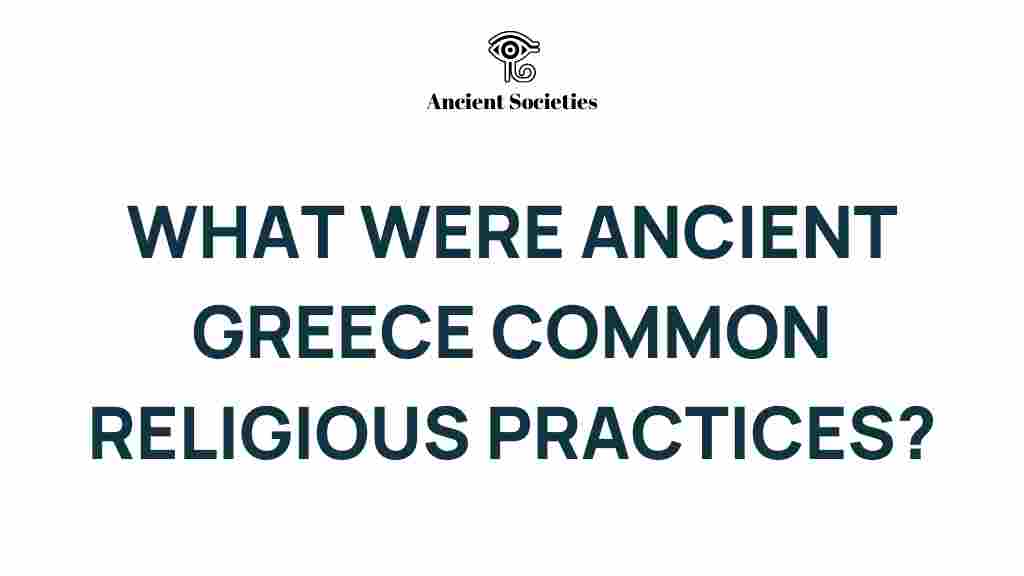Unveiling the Sacred: Ancient Greece’s Common Religious Practices
Ancient Greece is renowned for its rich tapestry of culture, society, and mythology. At the heart of this civilization were its religious practices, which shaped the lives of its people and influenced their daily routines. From elaborate rituals to grand festivals, the worship of gods was interwoven with the fabric of Greek life. This article delves into the common religious practices of Ancient Greece, exploring their significance, rituals, and the enduring impact on society and culture.
The Pantheon of Gods
The religious framework of Ancient Greece was polytheistic, centered around a pantheon of gods and goddesses. Each deity had distinct attributes, areas of influence, and was worshipped through various rituals and ceremonies. The major gods included:
- Zeus – King of the gods, associated with the sky and thunder.
- Hera – Queen of the gods, protector of marriage and family.
- Poseidon – God of the sea, earthquakes, and horses.
- Athena – Goddess of wisdom, warfare, and crafts.
- Apollo – God of the sun, music, and prophecy.
- Dionysus – God of wine, fertility, and revelry.
These gods were not only revered but also feared, as they were believed to influence every aspect of life, from agriculture to warfare. The relationship between the Greeks and their deities was characterized by a delicate balance of worship, offerings, and rituals intended to appease these powerful beings.
Rituals of Worship
The rituals performed in Ancient Greece were diverse and varied, often depending on the deity being honored. Common practices included:
- Prayers: Regular invocations to the gods, often recited before meals or significant events.
- Offerings: Sacrifices of animals, fruits, and other goods were made to gain favor from the gods.
- Purification Rites: Rituals involving cleansing with water or incense to prepare for worship.
- Divination: Seeking guidance from the gods through oracles, such as the famous Oracle of Delphi.
These practices were not only spiritual but also served to unite communities. They fostered a sense of shared identity and purpose among the people of Ancient Greece.
Temples: The Abodes of the Gods
Temples were central to Ancient Greek religious practices. They were not merely places of worship but also served as community centers and symbols of civic pride. Each temple was dedicated to a specific deity and housed a cult statue, often made from precious materials. Some notable temples include:
- The Parthenon: Dedicated to Athena, located on the Acropolis of Athens.
- The Temple of Apollo: Situated at Delphi, famous for its oracle.
- The Temple of Zeus: Located in Olympia, where the ancient Olympic Games were held.
These structures were designed to reflect the greatness of the gods they honored, featuring impressive architecture, sculptures, and intricate reliefs. The temples served as focal points for rituals and gatherings, reinforcing the connection between the divine and the community.
Festivals: Celebrations of Faith
Festivals were a significant aspect of Ancient Greek religious practices, providing opportunities for communal worship and celebration. Major festivals included:
- The Olympic Games: Held every four years in honor of Zeus, featuring athletic competitions.
- Thesmophoria: A festival dedicated to Demeter, celebrating fertility and the harvest.
- Dionysia: A festival in honor of Dionysus, featuring theatrical performances and revelry.
These festivals often included processions, sacrifices, and theatrical performances, drawing participants from across city-states. They reinforced social bonds and provided a platform for artistic expression, highlighting the interplay between culture and religion in Ancient Greece.
The Role of Mythology in Religion
Mythology was integral to Ancient Greek religious practices. The myths surrounding the gods and their interactions with humans provided explanations for natural phenomena and cultural norms. Key themes included:
- Creation Myths: Stories like that of Prometheus, who brought fire to humanity.
- Heroic Myths: Tales of heroes such as Hercules and Achilles, often intertwining with divine influence.
- Moral Lessons: Myths served to impart values and lessons about hubris, piety, and justice.
These narratives were not only religious but also cultural touchstones that shaped Greek identity and societal values. They were shared through oral tradition, literature, and art, remaining influential throughout history.
Society and Religion: A Symbiotic Relationship
The religious practices of Ancient Greece were deeply embedded in the social structure. Religion influenced various aspects of daily life, including:
- Politics: Many city-states viewed their governance as divinely ordained, with rulers often claiming descent from gods.
- Economics: Festivals and rituals stimulated local economies through trade and tourism.
- Education: Philosophical schools often integrated religious teachings, exploring the nature of the divine.
This synergy between religion and society fostered a cohesive cultural identity, with shared beliefs and practices uniting diverse populations across the Greek world.
Troubleshooting Common Misconceptions
Many misconceptions exist about Ancient Greek religious practices. Here are some common myths and clarifications:
- Myth: Greeks were solely focused on rituals without understanding their significance.
- Fact: Rituals were deeply meaningful, embodying community values and shared beliefs.
- Myth: All gods were equally revered by all city-states.
- Fact: Different city-states had patron deities and unique religious customs.
By understanding these nuances, we can appreciate the complexity and richness of Ancient Greek religious practices.
Conclusion: The Legacy of Ancient Greek Religion
Ancient Greece’s religious practices shaped its society and culture in profound ways. The worship of gods, rituals, festivals, and mythology created a cohesive framework that influenced art, politics, and daily life. As we explore these ancient beliefs, we gain valuable insights into the human experience and the ways in which faith shapes culture.
For further reading on the topic, consider visiting this external link for a comprehensive overview of Greek religion and its impact. To dive deeper into the interplay of culture and religion, check out our internal link on related cultural practices in Ancient Greece.
This article is in the category Culture and created by AncientSocieties Team
